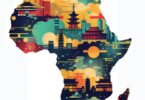Rokhaya Diallo
Those with passport privilege are finding out what it feels like to have limited freedom of movement. “Senegal halts air traffic from several countries including France, Italy, Spain and Belgium”
I had to read that headline twice before realising that it was indeed happening. Thanks to the Covid-19 pandemic, an African nation has decided to ban all access to its borders to anyone coming from several European countries.
For too long now, we have become accustomed to seeing western countries ban other citizens from entering their borders, or at the very least enacting strict requirements to keep them out. These restrictions allow Western countries to control other citizens’ ability to travel the world freely. So, you can understand why it took me some time to digest the present inverted reality.
While enjoying their right to visit almost any country in the world without going through painful and sometimes even humiliating administrative processes, Europeans have never had to bother with what it feels like to not have access to a country because of one’s citizenship or country of origin. Passport privilege is real. Some passports are a magical ‘open sesame’ whereas others lead to closed doors.
Even the vocabulary that accompanies people’s movement reflects this balance of power. When someone from the West moves to any other country, they are seen as free and adventurous expatriates and admired for being so curious about the world. But when the same move is made from a developing country to a richer one, the gaze is not as benevolent. The label “migrant” is reserved for a particular type of movement that carries the notion that someone is about to become an uninvited burden on others. People born with the privilege of the open-sesame-passport are unable to imagine their freedoms restricted on account of where they come from.
So last week when a group of Italian tourists went to visit Tunisia they could never have pictured themselves being forced out of the country.
In an application of protocol on their arrival, they were required to be kept in isolation for 14 days (the duration of the incubation of the virus). When the aspiring tourists refused, authorities sent them right back to the airport. Indeed, given their passport privilege, those tourists probably couldn’t believe that their refusal would lead to an unceremonious exit.
A similar event took place earlier in Mauritania when it deported fifteen Italian tourists before closing its borders. From a European perspective, it sounds shocking, but it is nothing more than routine treatment for many Africans who have tried to travel abroad. When Morocco suddenly decided to close itself to the rest of the world, French tourists trapped there caused major incidents at the airport. Scenes of panic, tears and tantrums buzzed all around the Internet.
Being unable to move from where you are makes one afraid and angry, and we can easily understand why. It is a basic human need to be allowed to move from a country to another. It is a human right set out by the universal declaration of human rights, which declares in Article 13: Everyone has the right to freedom of movement and residence within the borders of each state. Everyone has the right to leave any country, including his own, and to return to his country. In troubled times, it is crucial to know that you can move to any place you would like to go. When France announced – among an unprecedented list of decisions – the lockdown of the country, the first reaction of many Parisians and others who could afford it, was to leave to places more suited for outdoor life.
For now, twenty-six countries in Africa have been infected by the coronavirus, and many of them have had to make drastic decisions to stop its spread. Some of these are former French colonies or protectorates that are in many ways still treated as French preserves. No one could have predicted a move from them that would stop the former colonisers from accessing their lands.
As Africa has not reached its pandemic peak as yet, Europe, a hotspot of the spread of the Covid-19 is discovering through the astonished eyes of its citizens how it feels to be seen and treated as a pariah. It is reported that 130,000 Fre-nch citizens are locked out of their country due to border closures or flight cancellations. Sadly, many of t-hem complain about “bei-ng rejected by the local po-pulation, like plague victims.”
Being stigmatised beca-use of your identity, or cou-ntry of origin is the most common experience among people pejoratively called migrants because they m-ove from Africa, South A-merica or Asia, and it does not raise as much attention and solidarity as it should.
The definition of an acceptable migrant and an undesirable one fluctuates, and more and more people need to know how hurtful and even frightening it can be not to have the privilege of carrying a passport that grants access to every place on earth.






